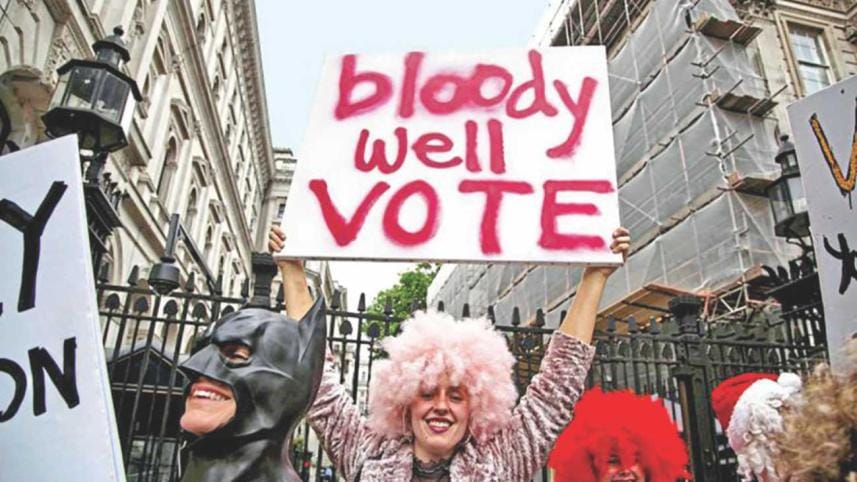Britain En Marche?

We live in a politically turbulent age. Parties barely a year old have recently swept to power in France and in the huge metropolitan area of Tokyo. A party less than five years old is leading opinion polls in Italy. A political neophyte is sitting in the White House, to the profound discomfort of establishment Republicans and Democrats. So where will the political earth shake next? The answer could be—indeed, should be—the United Kingdom.
Even as the UK faces the upheaval of Brexit, nobody is talking about remaking—much less replacing—the established political parties. Many deny that they would even consider such a thing. Former Prime Minister Tony Blair—a pro-European centrist innovator who won three general elections for his Labour Party in the 1990s—took great care in a recent article to stress that he is "not advocating a new Party."
But Blair, or someone like him, should be doing just that. After all, while the British political system does put formidable barriers in the path of any new party, the chances of success are greater now than at any time in the last 40 years. In a political system still feeling the aftershocks of two major earthquakes—the June 2016 Brexit referendum and, a year later, the humiliating electoral setback of the Conservative Party that spearheaded it—there is a clear opportunity for newcomers.
Already, the Conservatives are locked in an internal battle that they can only try to obscure. In the Labour Party, too, rebellions are erupting. Now is the moment for a new party, styled after French President Emmanuel Macron's "La République En Marche," to capitalise on the division, disarray, and distrust in the established parties. Now is the moment for a photogenic young British man or woman to follow in the 39-year-old Macron's footsteps, making history by casting aside the old guard.
Of course, as Blair suggested, Britain's first-past-the-post electoral system, based on single-member constituencies, implies huge advantages for the established political parties. A new party could well find—after spending huge sums of money and energy, and perhaps even securing a sizable chunk of the vote in its debut general election—that its voters are spread too thinly across the country to deliver more than a handful of parliamentary seats.
That is what happened the last time a new centrist party entered the fray. In the early 1980s, four defectors from Labour, alarmed by their party's leftward shift and anti-EU stance, created the Social Democratic Party. Capitalising on the unpopularity of Prime Minister Margaret Thatcher's early economic policies, the new SDP—in alliance with the small Liberal Party—won 25 percent of the national vote in the 1983 general election. But they ended up with a mere 23 seats. It was all downhill from there.
That memory is discouraging political innovation today. Those in Labour who are deeply suspicious of the left-wing economic and foreign-policy stance of their popular leader, Jeremy Corbyn, still think the most sensible strategy is to be patient and, when the opportunity arises, to recapture their party. The same goes for Conservatives who think Brexit is leading the country to disaster.
But the history of the SDP can and should be read in a different way. At one point in 1982, the party was attracting the support of more than 50 percent of voters in opinion polls. Many senior Conservative figures were saying privately at the time that they thought the SDP was going to win the next election in a landslide.
Then came the Falklands War, which amounted to a major victory for Thatcher. So it was the Conservatives who ended up winning the 1983 election in a landslide—a result that launched the still-unpopular Labour's long trudge back toward the political centre.
Today, no major victory looks to be in the cards for Labour or the Conservatives. Moreover, the recent election—in which the Conservatives' 20-point lead disappeared seemingly overnight, as voters, especially young people, threw their support behind Labour—suggests that British voters are up for grabs.
The recent election held another important lesson: Europe and Brexit is not the issue that British voters care about most today. Corbyn's Labour ran on the same Brexit policy as May's Conservatives. But on issues like jobs, hospitals, schools, and the welfare state, their approaches contrasted sharply.
To defeat the establishment parties, therefore, a new political movement would have to stand, first and foremost, for restoring public services, reviving the economy, and rebuilding trust. A strong relationship with the EU should be pitched as a means to advance these goals, not as a goal in itself.
In the next few months, an opportunity to create such a movement may well present itself. It depends, first, on whether leadership ambitions and divisions over Brexit consume the Conservative Party and, second, on whether the recent rebellion of more than 50 senior Labour members over Corbyn's Brexit policy escalates.
Anyone considering such an opportunity should remember the Falklands, and wonder what the SDP might have become had Argentina not invaded. And they should recall the motto of the British special forces: "Who Dares Wins."
Bill Emmott, a former editor-in-chief of The Economist, is Chairman of the Wake Up Foundation.
Copyright: Project Syndicate, 2017.
www.project-syndicate.org
(Exclusive to The Daily Star)

Comments